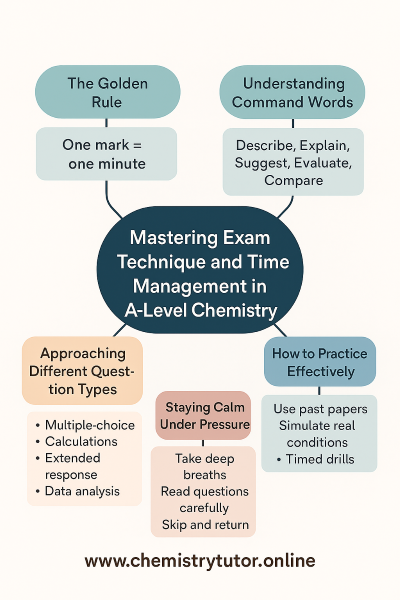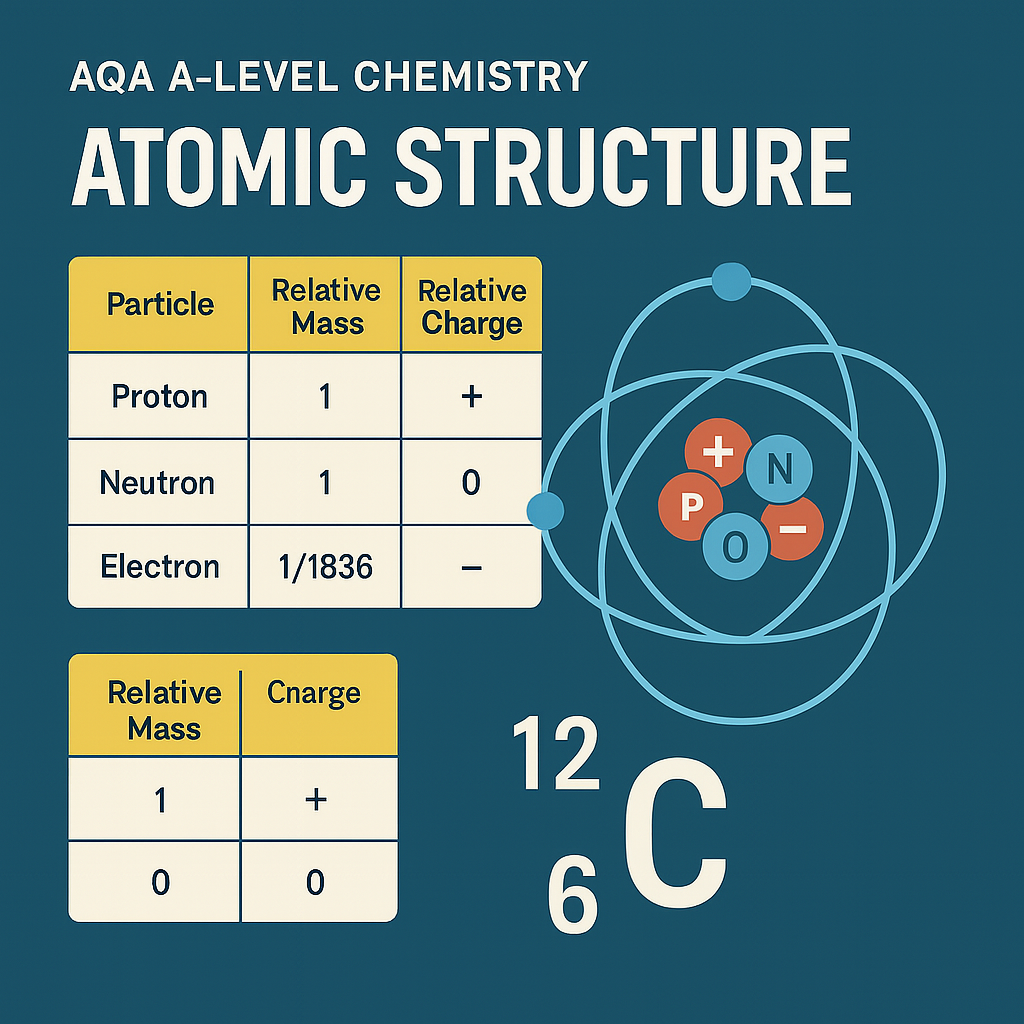Mastering Exam Technique and Time Management in A-Level Chemistry
Getting an A* in A-Level Chemistry isn’t just about intelligence. It’s about exam-smart tactics, time discipline, and understanding exactly what examiners are looking for.
You can revise for months, know your topics inside out, and still underperform if your exam technique isn’t solid. That’s because A-Level Chemistry doesn’t just test what you know—it tests how well you apply it under pressure. Time is limited, the wording can be tricky, and mistakes often come from panic rather than ignorance.
This post will guide you through the most effective exam strategies, time-saving tips, and proven ways to boost your grade through better technique, not just more revision.
Understanding how A-Level Chemistry papers are structured
Before we get to the tactics, let’s take a quick look at what you’re up against.
Paper 1: Inorganic and Physical Chemistry (typically 2 hours, 105 marks)
Paper 2: Organic and Physical Chemistry (also 2 hours, 105 marks)
Paper 3: Synoptic, practical-based questions and multiple choice (2 hours, 90 marks)
Each paper blends:
Short-answer factual recall
Extended calculation questions
Application and analysis (often in unfamiliar contexts)
Practical skills and data interpretation
Understanding the paper format helps you plan how much time to spend on each section.
The golden rule: marks = minutes
A classic rule of thumb in A-Level Chemistry is: one mark = one minute.
A 4-mark question? Spend no more than 4 minutes.
A 6-mark question? Time yourself to finish in 6 minutes.
If you get stuck, skip and come back. Don’t let one question destroy your pacing across the whole paper.
Time management plan for a 2-hour paper (120 minutes)
Here’s a sample time allocation for a 105-mark paper:
First 15 mins: Work quickly through all short (1–3 mark) questions to pick up easy wins.
Next 90 mins: Tackle longer questions, working mark-by-mark. Prioritise anything worth 6+ marks.
Final 15 mins: Review skipped questions, double-check calculations, re-read the last few answers.
Tip: Circle the questions you skip and write a “?” next to them. You won’t waste time searching for them later.
Exam technique: how to approach different question types
Let’s break down strategies by question type.
1. Multiple-choice questions (MCQs)
Strategy:
Don’t just pick the answer you think looks right. Eliminate the obviously wrong options first.
Watch out for negatives (e.g. “Which is NOT…”).
Estimate and calculate where needed—some MCQs involve mole calculations or enthalpy data.
Common traps:
Rushing and misreading the question
Second-guessing yourself—stick with your first instinct unless you’re sure
2. Calculations
Strategy:
Always write the formula before plugging in numbers.
Include units at each step. You often get marks for units even if the number is wrong.
Don’t round too early. Round only at the final step.
Common traps:
Getting decimal places wrong (e.g. using 0.1 instead of 0.01)
Not converting units (e.g. cm³ to dm³)
Copying calculator numbers incorrectly
Examiner tip: Even if you get the final number wrong, you can still earn 2-3 marks for method. Always show your working clearly.
3. Extended response / 6-mark questions
Strategy:
Use PEE: Point, Evidence, Explanation.
Structure your answer in steps.
Underline or highlight key command words: “Explain,” “Describe,” “Calculate,” “Evaluate.”
Common traps:
Writing everything you know (irrelevant info = no marks)
Forgetting to answer all parts of the question
Leaving blanks because you feel overwhelmed
💡 Pro tip: Break big questions into bullet points before writing your paragraph. It helps you stay logical and not waffle.
4. Data analysis and practical-based questions
Strategy:
Refer to actual figures when interpreting tables/graphs.
Learn how to calculate percentage errors and use significant figures correctly.
Link your answer to what the experiment is measuring (e.g. “The temperature rise suggests…”)
Common traps:
Ignoring the context of the question
Giving general answers (e.g. “the experiment was wrong”) without specifics
How to interpret command words like an examiner
Many students lose marks simply by misunderstanding what the question wants.
| Command Word | What It Means |
|---|---|
| Describe | Say what you see—no explanation needed. |
| Explain | Give reasons—link cause and effect. |
| Suggest | Think creatively based on what you know. |
| Evaluate | Weigh up pros and cons, then conclude. |
| Calculate | Show full working with units. |
| Compare | Give similarities AND differences. |
How to stay calm and focused under pressure
Even if your technique is flawless, nerves can ruin everything. Here’s how to manage exam stress on the day.
Before the exam:
Eat a protein-based breakfast (avoid sugary highs and crashes)
Bring a water bottle, spare pens, and calculator batteries
Do a warm-up paper the night before, then switch off
During the exam:
Read every question twice
Breathe when you feel stuck—don’t panic, just skip and return
Check the time every 10–15 minutes
If your mind goes blank:
Write down everything you do know about the topic. Often this triggers your memory.
Re-read the question. Most contain clues.
Move on and come back later—it’s better to answer other questions while you can
Mastering Exam Technique & Time Management in A-Level Chemistry Exams
The 5 most common exam mistakes—and how to avoid them
Not showing working
Even if the answer’s wrong, method marks can save you
Forgetting units
Include them every time—you can lose easy marks for this
Writing waffle instead of facts
Chemistry is a science—stick to precise, structured explanations
Leaving blanks
Never leave a question unanswered; even 1 mark is worth trying
Not managing time
Time lost on one tough question can cost you several easy ones
How to practise exam technique before the big day
Use past papers—but simulate real conditions
Set a timer. Sit in silence. Don’t look up answers as you go.
Do full papers, not just questions.
After marking, go back and write out perfect answers to your mistakes.
Use mark schemes and examiner reports
These show exactly how marks are awarded.
Examiner reports also highlight common student errors.
Use spacing and timed drills
Do 30-minute challenges: “Answer these 4 questions in 30 mins.”
Focus on completing questions within time limits, not just accuracy.
What to do in the final week before the exam
Focus on recap, not learning new content
Do 2–3 timed papers across different topics
Review your most common mistakes
Use flashcards and quick quizzes for memory refresh
Final thoughts: you don’t need to be perfect—just exam smart
Getting an A* in A-Level Chemistry isn’t just about intelligence. It’s about exam-smart tactics, time discipline, and understanding exactly what examiners are looking for.
Even strong students lose marks from small, avoidable errors. But now you know how to avoid them. Work through past papers, stay aware of timing, and approach each question with clarity and strategy.
If you want to turn solid revision into top exam marks, Dr Marguerite Quinn can help. With a PhD in Chemistry and over 3,470 hours of teaching experience, Marguerite specialises in helping A-Level students master exam technique, time management, and confident exam performance.






Understand AQA A-Level Chemistry Section 3.1.1.2 on mass number and isotopes. Learn key definitions, isotope notation, calculations, and how this topic builds your scientific and exam skills.